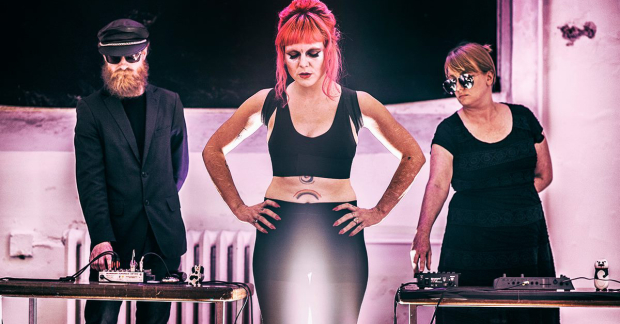Edinburgh review: (I Could Go on Singing) Over the Rainbow (Summerhall)

© Jannica Hone
"Over the Rainbow has become part of my life," Judy Garland wrote in a letter to the composer Harold Arlen years after The Wizard of Oz. In it, she claims to have sung the song thousands of times over, yet still hold it dear. "It’s so symbolic of everybody’s dreams and wishes that I’m sure that’s why some people get tears in their eyes when they hear it." Arlen wrote it in 1936, in the thick of the Great Depression. This song of soaring hope sprung from the darkest of times.
FK Alexander makes that manifest in this performance installation: an hour of abrasive noise music intermittently interrupted as Alexander sings Garland’s signature song over and over again, to one person at a time. It’s a simple, but multifaceted, expression of art’s balm against the agonies of existence – particularly in troubled times.
In a roomful of noise, the sort that puts a second heartbeat into your chest, Alexander stands waiting; her eyes glittery, her hair candy pink. The music, a roar of static set to a beat, bounces around your ears. It makes your body brace a bit. It almost – almost – hurts. But not quite. You have to bear it.
Each of us holds a ticket – a stub that says ‘Admit One’. In front of Alexander, between the two speakers, there’s a black X taped on the floor. When it’s free, any one of us can step onto it and cash in our stub in exchange for the song.
When we do, Alexander steps to the side to prepare. She puts on a holster, a sequinned jacket, sips water, checks her make-up and slips on those red shoes. Then she holds the listener’s hand, looks deep into their eyes, waits for the moment, and sings over the noise. At one point, her hand presses against her heart. Sometimes she winks. She hits the last note and the lights go wild, a scorching white strobe, then signs off with a soft kiss on the cheek.
The action changes as it repeats. Initially, it looks a lot like love – two people, eyes locked, oblivious to the roar around them. With each repetition, however, it looks increasingly impersonal: empty, fake, endlessly repeatable. A performance. Alexander demonstrates the demands we make on artists – all the more pertinent given Garland’s personal disintegration – but also the labour of performance and the hollowness of such encounters. It’s all a machine.
And yet it still helps, still beats the blasting sound. The song might not drown it out, but it makes it bearable. Beautiful, even. Art as a respite. Hope against horror. With each repetition, its effect wears off a little. But then, so does the drone. Your ears adjust. You begin to bear it. You get bored.
Originally a six-hour durational piece, what the hour-long piece loses in exhaustion and endurance, it gains in interaction and impact. Not only do we have to stick the full hour out, only a handful of us can have the individual experience. Your stub gains currency. People elbow their way to the cross, fighting for their magic moment – an exclusive, even selfish, act. And yet, an empty one. Once it’s over, once you’ve used your ticket, what gets you through the rest? Your troubles might melt like lemon drops, but only temporarily. Only once in a lullaby.
(I Could Go On Singing) Over the Rainbow runs at Summerhall until 28 August (except 23).










